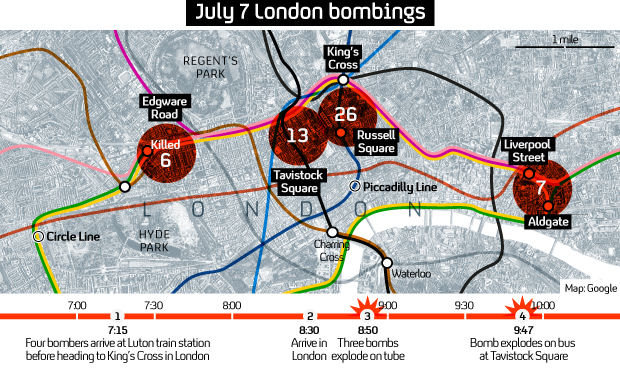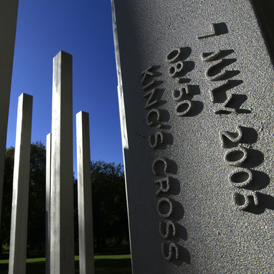July 7 inquest: victims unlawfully killed
 Andy Davies
Home Affairs Correspondent
Andy Davies
Home Affairs Correspondent
Each of the 52 victims of the terrorist attacks on London would have died regardless of the response by the emergency services, a coroner says. Andy Davies hears the reaction.
After months of hearing evidence at the inquests into the London bombings, the coroner ruled 52 people were killed “unlawfully” by suicide bombers on 7 July 2005.
Lady Justice Hallett said the evidence “does not justify the conclusion that any failings of any organisation or individual caused or contributed to the deaths”.
She ruled that the evidence relating to each of the 52 victims “leads to only one sad conclusion”.
“I am satisfied on the balance of probabilities that each of them would have died whatever time the emergency services reached and rescued them,” Lady Justice Hallett said.
“Each of them would have died whatever time the emergency services reached and rescued them.” Lady Justice Hallett
She spoke to a courtroom packed with bereaved families and survivors who have waited nearly six years for answers to their questions about how four suicide bombers were able to carry out the 7 July 2005 attacks on London.
John Taylor, father of Carrie, 24, who died in the bombing at Aldgate on the Circle Line, was visibly moved as the coroner turned to his daughter’s death. At one point, he wiped his eyes while his wife wept softly, dabbing a tissue to her face.
The coroner referred specifically to Carrie saying that on the balance of probabilities she would not have survived her injuries.
Earlier this year the man who cradled Carrie Taylor as she died told Channel 4 News how, almost six years on, he stills thinks about her “every day”.
Steven Desborough was travelling on the tube when he went to help injured passengers of the Aldgate blast. He met Carrie’s parents in person for the first time at the inquest.
John Taylor told Channel 4 News that he was grateful to Steven Desborough for being with his daughter in her final moments, and said the inquests had helped close a chapter in his life.
On Friday the coroner paid tribute to the “quiet dignity” of the families of the innocent victims, saying she was making a series of recommendations which “may save lives” in the future.

‘No bomber inquest’
She also thanked the survivors of the attacks, many of whom are still suffering from the trauma of their horrific experiences, for giving evidence to the inquest.
“Reliving the events of 7/7 was the last thing they needed,” she said.
As well as announcing her verdicts for the 52 people killed in the attacks on three Tube trains and a red double-decker bus, Lady Justice Hallett ruled that a separate inquest for the four bombers should not be resumed.
The bombings carried out by Mohammed Sidique Khan, 30, Shehzad Tanweer, 22, Hasib Hussain, 18, and Jermaine Lindsay, 19, were the worst single terrorist atrocity on British soil.
MI5 review ordered
The coroner made a series of recommendations for MI5, the emergency services and Transport for London aimed at saving lives in the future.
MI5 was ordered to review its procedures on showing photographs to informants after failings before the bomb attacks in the capital.

Lady Justice Hallett expressed concerns about the Security Service’s record-keeping and warned of “possibly dire consequences of a flawed decision which cannot be properly supervised”.
Bereaved families called for the coroner to make 32 recommendations, including nine relating to the alleged failure by MI5 and the police to stop the atrocities.
Emergency service chiefs said they would digest the coroner’s findings and review the recommendations.
The ambulance service said on Friday that its performance on 7 July 2005 could “have been better”.
“I am pleased that the coroner recognised the bravery and care shown by our crews,” But London Ambulance Service chief executive Peter Bradley said.
“I recognise that certain aspects of our response should have been better.”
Chiefs of the other emergency services said they were proud of the work done by police, paramedics and firefighters.
The inquest at the Royal Courts of Justice in London began in October and heard five months of harrowing and often shocking testimony before closing its evidence sessions in March.
It had a wide-ranging remit to examine whether the emergency services’ response was adequate and whether MI5 could have prevented the attacks.
-
Latest news
-
As India goes to the polls in the world’s largest election – what do British-Indians think?17m

-
Tees Valley: Meet the candidates in one of the biggest contests coming up in May’s local elections4m

-
Keir Starmer says public sector reform will be a struggle7m

-
Nicola Sturgeon’s husband Peter Murrel charged with embezzlement of funds from SNP1m

-
Ukraine might finally get $60billion in American weapons and assistance to defend against Russia3m

-





